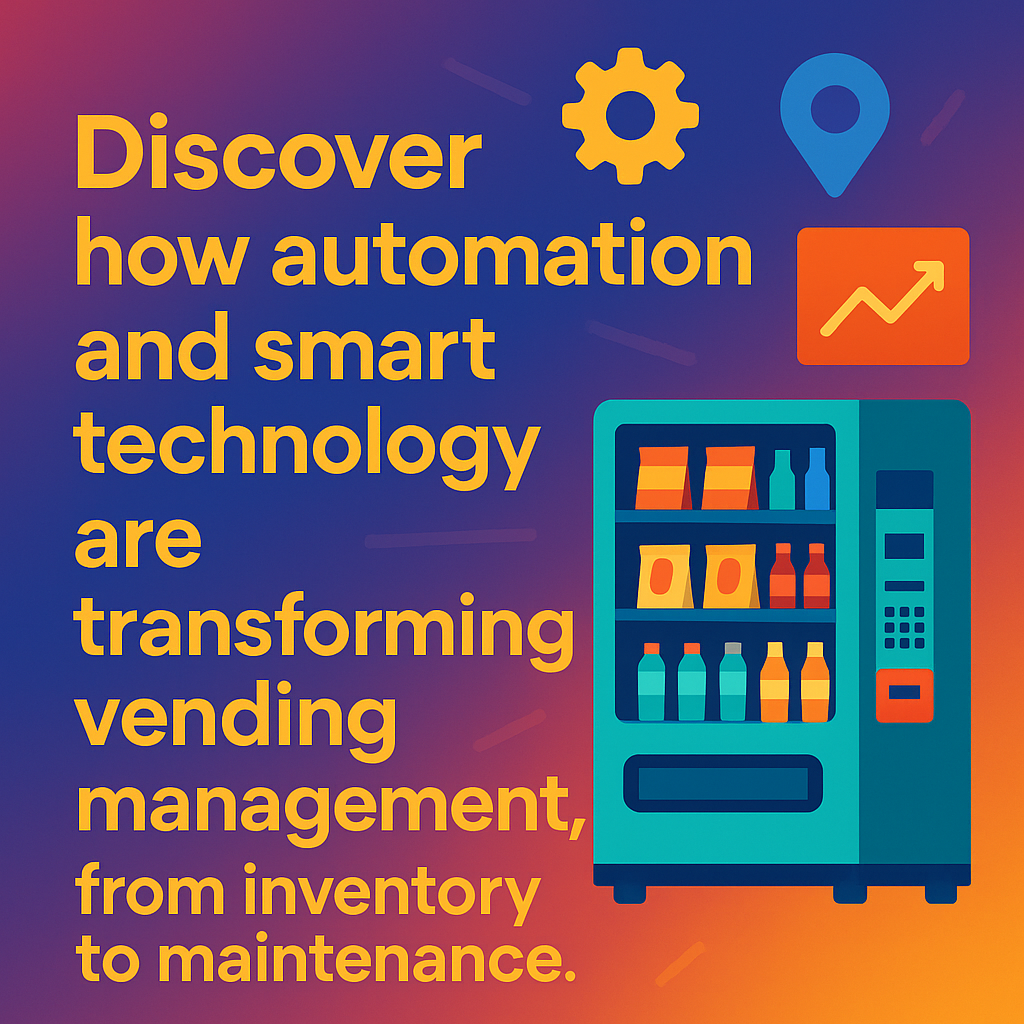Leveraging Technology for Automated Vending Management
Discover how automation and smart technology are transforming vending management, from inventory to maintenance.
Back to Vending Management Companies ResourcesDiscover how automation and smart technology are transforming vending management, from inventory to maintenance.
Back to Vending Management Companies ResourcesEmbrace the future of vending with technology that offers real-time monitoring, predictive maintenance, and optimized inventory for unparalleled efficiency.
![]() Real-time inventory tracking prevents stockouts and optimizes product mix
Real-time inventory tracking prevents stockouts and optimizes product mix
![]() Remote diagnostics and alerts ensure maximum machine uptime
Remote diagnostics and alerts ensure maximum machine uptime
![]() Data-driven insights lead to better profitability and customer satisfaction
Data-driven insights lead to better profitability and customer satisfaction

The vending industry is undergoing a significant transformation, moving beyond simple coin-operated machines to sophisticated, interconnected systems. Leveraging technology for automated vending management is no longer a luxury but a necessity for businesses aiming for efficiency, profitability, and enhanced customer satisfaction. This new era of smart vending redefines how machines are stocked, maintained, and operated.
At the heart of automated vending management is real-time data. Modern vending machines are equipped with telemetry systems and sensors that continuously monitor inventory levels and sales patterns. This allows operators to know exactly what products are selling, at what rate, and when a machine needs restocking. The result is a dramatic reduction in stockouts of popular items and minimization of expired products, leading to higher sales and happier customers. This intelligent approach helps businesses optimize their product mix and maximize profitability per machine.
Downtime is a major enemy of vending machine profitability. Automated vending management addresses this head-on through predictive maintenance and remote diagnostics. Machines can send alerts for potential issues before they become critical failures, allowing for proactive servicing. This remote monitoring capability means that operators can check machine health, identify errors, and even troubleshoot some problems without physically visiting the site, drastically reducing response times and repair costs. For businesses looking for insights into how these systems interact, understanding how vending machine inventories get updated offers a deeper dive into the technical processes.
From the customer's perspective, automated vending management translates to a more reliable and convenient experience. Machines are consistently stocked with their favorite items, payment options are diverse (including cashless and mobile payments), and machines are less likely to be out of order. For operators, the benefits extend to streamlined operations, optimized routes for servicing, and data-driven decision-making for product selection and pricing. This technological leap allows vending services to seamlessly integrate into various environments, from corporate offices to public spaces, providing a consistent and high-quality service. Further details on operational requirements, including connectivity, can be found by exploring do vending machines need WiFi.
Automated vending management uses smart technology and software to remotely monitor, manage, and optimize vending machine operations, reducing manual intervention.
Real-time telemetry and sensors track product levels, enabling operators to know exactly what's selling and when to restock, minimizing stockouts and overstocking.
Remote monitoring allows operators to track machine status, sales data, and error alerts from anywhere, leading to faster response times and predictive maintenance.
Yes, advanced software analyzes sales and inventory data to suggest the most efficient routes for restocking and servicing, saving time and fuel costs.
Newer machines accept a variety of cashless options including credit/debit cards, mobile payments (e.g., Apple Pay, Google Pay), and sometimes even cryptocurrency.
AI can predict consumer preferences, optimize product placement, enhance security through facial recognition, and power smart coolers for a frictionless shopping experience.
Absolutely. By analyzing operational data, smart systems can anticipate potential machine failures and schedule maintenance proactively, preventing downtime.
It leads to more reliably stocked machines, fewer malfunctions, and a wider variety of popular products, all contributing to a better customer experience.
Yes, optimized routing reduces fuel consumption, while efficient inventory management lowers waste from expired products and unnecessary trips.
Many scalable solutions exist, making automated vending management accessible to businesses of all sizes, often integrated through full-service providers.